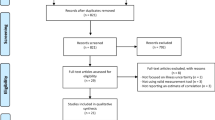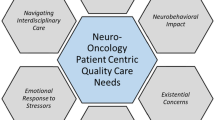Abstract
Patients with primary brain tumors (PBT) face uncertainty related to prognosis, symptoms and treatment response and toxicity. Uncertainty is correlated to negative mood states and symptom severity and interference. This study identified predictors of uncertainty during different treatment stages (newly-diagnosed, on treatment, followed-up without active treatment). One hundred eighty six patients with PBT were accrued at various points in the illness trajectory. Data collection tools included: a clinical checklist/a demographic data sheet/the Mishel Uncertainty in Illness Scale-Brain Tumor Form. The structured additive regression model was used to identify significant demographic and clinical predictors of illness-related uncertainty. Participants were primarily white (80 %) males (53 %). They ranged in age from 19-80 (mean = 44.2 ± 12.6). Thirty-two of the 186 patients were newly-diagnosed, 64 were on treatment at the time of clinical visit with MRI evaluation, 21 were without MRI, and 69 were not on active treatment. Three subscales (ambiguity/inconsistency; unpredictability-disease prognoses; unpredictability-symptoms and other triggers) were different amongst the treatment groups (P < .01). However, patients’ uncertainty during active treatment was as high as in newly-diagnosed period. Other than treatment stages, change of employment status due to the illness was the most significant predictor of illness-related uncertainty. The illness trajectory of PBT remains ambiguous, complex, and unpredictable, leading to a high incidence of uncertainty. There was variation in the subscales of uncertainty depending on treatment status. Although patients who are newly diagnosed reported the highest scores on most of the subscales, patients on treatment felt more uncertain about unpredictability of symptoms than other groups. Due to the complexity and impact of the disease, associated symptoms, and interference with functional status, comprehensive assessment of patients is necessary throughout the illness trajectory.

Similar content being viewed by others
References
New York Times (2014) How long have I got left? http://www.nytimes.com/2014/01/25/opinion/sunday/how-long-have-i-got-left.html?_r=1. Accessed 14 Feb 2014
Preusser M, de Ribaupierre S, Wöhrer A, Erridge SC, Hegi M, Weller M, Stupp R (2011) Current concepts and management of giloblastoma. Ann Neurol 70:9–21
Stupp R, Hegi ME, Gilbert MR, Chakravarti A (2007) Chemoradiotherapy in malignant glioma: standard of care and future directions. J Clin Oncol 25:4127–4136
Brandes AA, Tosoni A, Spagnolli F, Frezza G, Leonardi M, Calbucci F, Franceschi E (2008) Disease progression or pseudoprogression after concomitant radiochemotherapy treatment: pitfalls in neurooncology. Neuro Oncol 10:361–367
Brandsma D, Stalpers L, Taal W, Sminia P, van den Bent MJ (2008) Clinical features, mechanisms, and management of pseudoprogression in malignant gliomas. Lancet Oncol 9:453–461
Mishel MH (1988) Uncertainty in illness. Image J Nurs Sch 20:225–232
Mishel MH, Clayton MF (2008) Theories of uncertainty in illness. In: Smith MJ, Liehr PR (eds) Middle range theory for nursing, 2nd edn. Springer, New York, pp 55–84
Lin L, Acquaye AA, Vera-Bolanos E, Cahill JE, Gilbert MR, Armstrong TS (2012) Validation of the Mishel’s uncertainty in illness scale-brain tumor form (MUIS-BT). J Neurooncol 110:293–300
Lin L, Chiang H-S, Acquaye AA, Vera-Bolanos E, Cahill JE, Gilbert MR, Armstrong TS (2013) Uncertainty, mood states, and symptom distress in patients with primary brain tumors: Analysis of a conceptual model using structural equation modeling. Cancer 119:2796–2806
Mishel MH (1981) The measurement of uncertainty in illness. Nurs Res 30:258–263
Mishel MH (1984) Perceived uncertainty and stress in illness. Res Nurs Health 7:163–171
Mishel MH, Braden CJ (1987) Uncertainty: a mediator between support and adjustment. West J Nurs Res 9:43–57
Armstrong TS, Mendoza T, Gning I, Coco C, Cohen MZ, Eriksen L, Hsu M, Gilbert MR, Cleeland C (2006) Validation of the M.D. Anderson symptom inventory brain tumor module (MDASI-BT). J Neurooncol 80:27–35
Brezger A, Lang S (2006) Generalized structured additive regression based on Bayesian P-splines. Comput Stat Data Anal 50:967–991
Belitz C, Lang S (2008) Simultaneous selection of variables and smoothing parameters in structured additive regression models. Comput Stat Data Anal 53:61–81
Burnham KP, Anderson DR (1998) Model selection and multimodel inference. Springer, New York
Brezger A, Kneib T, Lang S (2005) BayesX: analyzing Bayesian structured additive regression models. J Statistical Software 14:1–22
Louis DN, Ohgaki H, Wiestler OD et al (2007) The 2007 WHO classification of tumors of the central nervous system. Acta Neuropathol 114:97–109
Mishel MH (1999) Uncertainty in chronic illness. Annu Rev Nurs Res 17:269–294
Acknowledgments
The authors would like to thank the research subjects for their participation. The authors would also like to thank the CERN Foundation for the support of research assistant for data collection. This study is supported by the Dean’s Research Award from UT-Houston and the Collaborative Ependymoma Research Network (CERN Foundation).
Conflict of interests
Mark R. Gilbert—Advisory Boards: Genentech/Roche, Merck, Abbvie; Honoraria: Genentech/Roche, Merck. Terri Armstrong—Research Support: Genetech/Roche, Merck; Consultant: Immunocyte, Bristol Meyers. All remaining authors have no disclosures.
Author information
Authors and Affiliations
Corresponding author
Rights and permissions
About this article
Cite this article
Lin, L., Chien, LC., Acquaye, A.A. et al. Significant predictors of patients’ uncertainty in primary brain tumors. J Neurooncol 122, 507–515 (2015). https://doi.org/10.1007/s11060-015-1756-7
Received:
Accepted:
Published:
Issue Date:
DOI: https://doi.org/10.1007/s11060-015-1756-7




